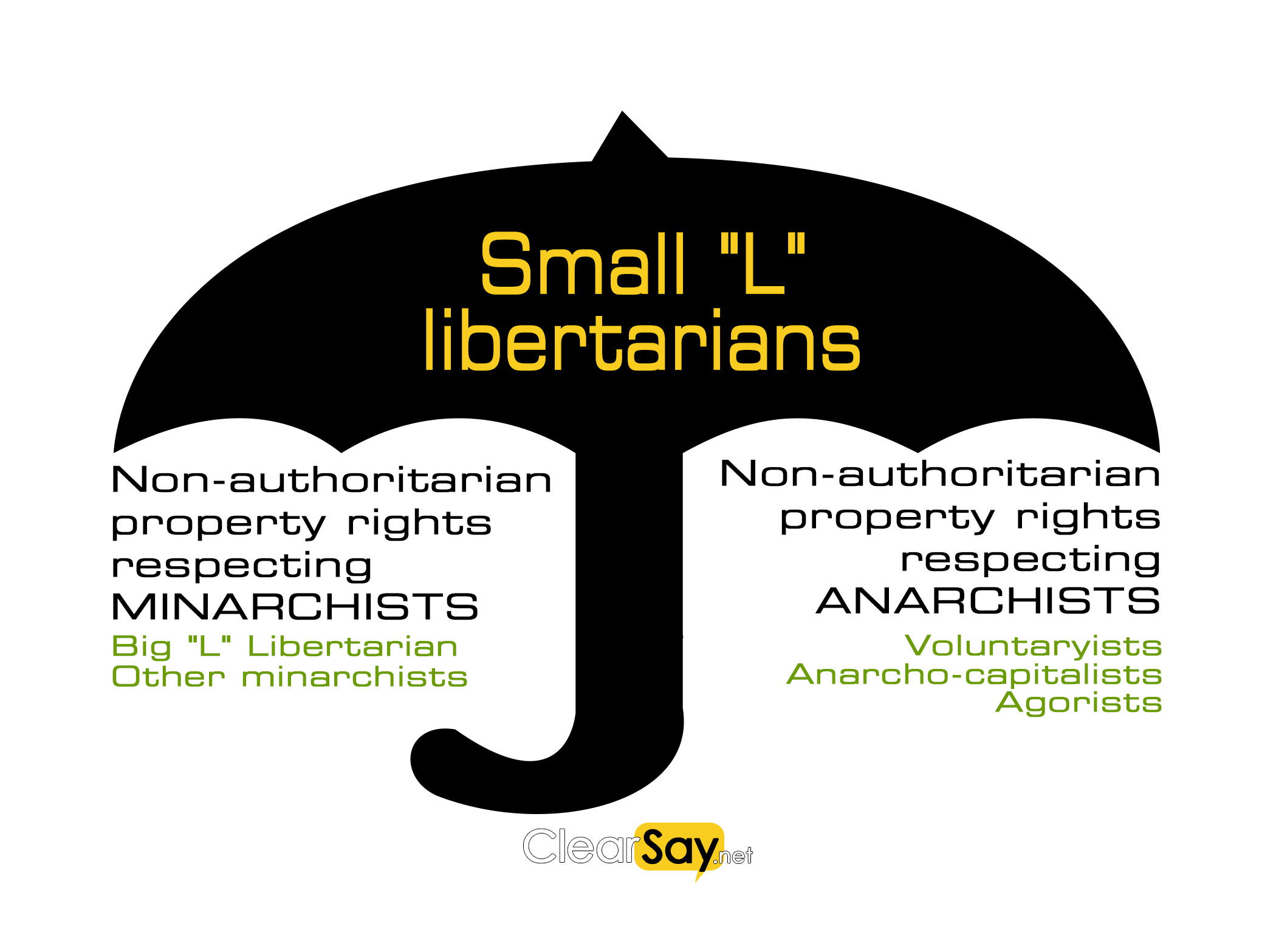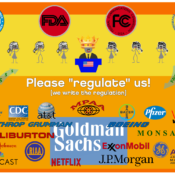Updated. Originally written in 2015.
“But… I thought we need a government to incentivize, force, and punish some behaviors so the weak and poor are not trampled under the boots of those with more power?”
This is a primary reason that a growing number of people wish to phase out involuntary government (hereinafter “government”) and replace it with voluntary governance.
First: Notice how right now, with government, people are being taken advantage of and it seems to be getting worse?
I want to make clear that our current system has not prevented people from taking advantage of other people.
Please at least acknowledge that the current system has some pretty big problems. Can I assume you do not agree with the USA’s war on terror, war on drugs, and/or war on health?
Voluntaryists share the same horror you feel! We see, for example, how unfair and destructive it is to enrich the military industrial complex while slaughtering humans in far away lands using American lives and tax money to fund it. Notice how our media and public education taught us to see those humans in other lands as enemies? What if they are people just like us and it is their rulers we should blame?
Same goes with Big Pharma lobbying politicians to outlaw healthy alternatives while pushing out poisonous remedies and untruths. How about 70% of the FDA’s money coming from the makers of the drugs they test? How about the millions in sponsorship money going from Big Pharma into mainstream media and social media? Please consider the shared values you have with Voluntaryists; values for choice, fairness, peace, community, security, prosperity, and consensus.
Let’s talk about how we can have a system, without government (but with voluntary governance), where there is less opportunity for powerful people to dominate others because no one will have access to that monolithic system of force. [An example of what I’m talking about is big corporations (govt entities) controlling politicians. Look up regulatory capture if you haven’t heard of it. It’s a cornerstone of the corporatism/cronyism/technocracy we see in the USA.]
Note, I said “less” regarding opportunities for domination. While Voluntaryists would love to work toward a better world, we (the smart ones) are not naive enough to believe it is possible to have a completely perfect world, and we are fine with that.
Utopia is not the goal; it’s the direction.
We don’t want to deny people their mistakes and lessons. We want to remove as much incentive for- and doing of- intentional initiation of force as possible. “What is virtue” goes deeper into human incentives to “do good”.
We can have a system where all rules are based on mutual consent, where people are free to choose to opt in or opt out of every service or plan, creating consequences for anyone attempting to use monopoly-like / government-like power against others. It also means no entity has a legitimized use of force.
Think about it: Our current governments have a monopoly on law-making, law-enforcement, national defense, currency, education, and a growing monopoly on health care. What has this led to? Are we rich? Are we peaceful? Are we well educated? Are we healthy?
When you hear the idea of zero government, is the first thing that comes to mind, “What about the roads?” Here’s one article of many addressing that.
Here’s another article, this one very specific, about a private road solving a problem: Guess Who Built the Roads?
Here’s an example of one of the many ways government mis-manages roads: Without Government, Who Will Force Drivers off Roads?
If your web search doesn’t turn up more examples, you are using the wrong search engine. Sadly Duck Duck Go has bowed to the technocracy/corporatism. I now use Brave Search along with Brave Browser.
“Voluntaryists are too trusting. People are not good enough for that system to work. If you get rid of government, then corporations and gangs would be free to coerce people.”
Answer: Voluntaryism is not pacifism
It is precisely because people will act in their own self interest that the current system of allowing some people to have power over others is not working. So no, Voluntaryism doesn’t believe or count on anyone being “good”. We are counting on people for the most part acting in their own rational self interest. If you think about it, you may be surprised how often our own self interest coincides with advancing the interests of those around us.
Remember: we are talking about a purely voluntary region where there is no legitimization of initiation of force. You know, like we were taught in kindergarten. That means the minute a person or firm initiates use of force, people are free to band together and stop it. More about that in the article here: Warlords. In that article, I also discuss how a modern voluntary region can be safe from outside invaders. Voluntaryists really do share your concerns.
Also, please keep in mind “corporation” is a government protected entity and “no government” means firms no longer have the following government-sanctioned benefits:
(a) Limited liability. Where corporations are shielded by government to limit the responsibility they take for their actions.
(b) Regulatory capture. Where corporations write or influence regulation through lobbying, campaign contributions, and revolving doors for CEOs/gov officials to favor their company and make it hard for competitors and newcomers in the same industry.
(c) Favoritism via government granted contracts and laws.
(d) Government granted patents and copyrights. https://clearsay.net/can-you-own-an-idea for a deeper look into the question, “Can you own an idea?”
(e) Protectionism via tariffs.
(f) Tax breaks.
(g) Bailouts.
Meaning: In a Voluntary society, companies can and will be held fully responsible to their customers by their customers as well as by the various watchdog groups that do and will exist.
Keep in mind that dispute resolution organizations (DROs) and private security organizations (PSOs) in a Stateless society will encounter a lot of skepticism and fear because people have experienced the Corporatism / Fascism we have now, having thrown off the shackles of a big, coercive central entity controlled by corporations. The smart DROs and PSOs will want to contractually reassure their customers by agreeing to be bound by large bonds to be forfeited if their Voluntaryist code of conduct is breached. Heck, their customers will demand this.
Plus, their competition will keep them on their toes: consider the many competing DROs and PSOs that will surely flourish in a market free of government “protection”.
Remember: peaceful solutions are typically more cost effective than violent solutions. Also remember that cost is not limited to money; reputation matters, especially in this age of instantaneous and wide-spread communication. Which often brings up the following question:
“But if you have competing PSOs and the owner of one PSO secretly buys up a couple DROs and watchdog companies, what happens?”
Every time the DRO pronounces an unfair judgement or otherwise does not serve their customers’ best interest, people talk. Word spreads. Again, remember, in a modern Stateless society, reputation has much more currency than it does in a system where powerful corporations can rely on the State to help fight off their competition.
Where would Pfizer be if it had not bribed Countries’ governments to limit liability for when people are harmed by their products? Did you know in most Countries you can not sue Pfizer if you are proven to be injured or killed by their products?
“Free Market” doesn’t just mean “free to make profits”; it means “free to make profits and losses”. It means the customer truly is king and employees have more power.
“But without government, any oversight on an industry will suddenly vanish! [in spite of customers still demanding that oversight.]”
Companies will form to address that demand by supplying auditing services.
Without a [regulatorily captured] state entity, like the FDA, for example, telling producers and consumers, “this food is safe,” people will have to do the research themselves or contract out that task to others whom they trust. Some will choose to take the risk themselves, perhaps in exchange for lower prices. Others will defer to auditors with strong reputations. Corruption in such an environment would cripple a business, as would practices like collusion. Will some still choose that path? Sure. But certainly no more than in our current systems of governing. And at least the parasites who in “this world” find ways to use government to limit their liability or competition will not exist in a Voluntaryist region.
A company choosing the less ethical route will have multiple class action lawsuits to contest when the malfeasance is discovered, everyone investing in them would be liable for damages, and so would the board for the ill done by the company. Also, their reputation will be destroyed. With so much risk, taking short term gains at the risk of long term survival is a bad business model, and one doomed to fail without the crafty company having a state to influence and manipulate.
“What about criminals? With no police, criminals will do as they please. You Voluntaryists assume people will behave like angels.”
Based on some things you have heard us say, it makes sense you might think this. We know humans are not angels. We assume all humans naturally want power and are corruptible, which is a big part of why we do not support handing people power-over-others in a non-consensual arrangement such as rulership. The short videos on the right side of this page answer this question in detail.
“But anarchy has never been done in the real world.”
Are you sure? Maybe you haven’t heard of the Ibos in West Africa or even 1000 years of anarchy in Ireland?
My Path to Voluntaryism
Prior to 1995 I was as Statist as anyone. I grew up dirt poor and even lived in two communes. My mother and I hitchhiked around the Nation and lived with whoever would take us in. I have a first-hand understanding of hardship, violence, lack of privilege, and responsibility. I learned to adapt. By 1995 I began to understand the social and economic ideas of Libertarians. Reading Atlas Shrugged was the catalyst.

Then, in 2011, coinciding with the death of my father and grandmother, I started listening to and having conversations with some highly intelligent Voluntaryists (re-branded from “Anarchists”) who inspired me to open my mind and study and compare “Keynesian” with “Austrian School” economics.
These “Voluntaryists” then helped me see that:
(1) Voluntaryism is based on the NAP (Non Aggression Principle) so its goal is actually the farthest from being a violent system, given the core value is non-coercion or “non initiation of force”. This is often (if not always) expressed as the opposite of the “ends justify means (Marxist)” justification for violence.
(3) There are many people with well-thought-out and scale-able ideas for systems allowing for large populations to have no government, which simultaneously allow for the creation of voluntary associations of people who have a common goal.
The goal is for an emphasis on voluntary-only trade to lead away from war/theft and toward generosity coming from the heart.
When you force a child to share their toys rather than leading by example, what prices do we all pay? Do you want them to grow up sharing because they were bullied into it (how likely is that to happen?) OR do you want them to grow up sharing because they freely choose to?
Please open your mind to the possibilities offered here. Far from being selfish, Voluntaryists want the same things you do; peace, health, safety, and prosperity for all. The power we want is “power-with” instead of the “power-over” model that is causing so much poverty and violence in this world.
One of those systems I found in the three “Law Without Government” videos on the top right. They total up to about 26 minutes. They explain a way people can have security in a Voluntaryist system I find practical and likely.
Devil’s Advocate Questions
(1)
By firing a person, you used force on them.
or
By not doing a thing, you are using force.
or
By saying a thing, you are using force.
Short answer: No. More here: https://clearsay.net/how-far-extend-definition-force
(2)
In the “Law Without Government, Principles” video above, it is clear to me that on the three-person-island or even in a larger community no one will accept someone who tries to grab at monopolization of the law. If people understand the ideas involved it will be seen as unfair, and just like with other unfair practices, it will damage the reputation of the arbitrator, losing them business. But in reality I doubt it would be a sudden and easily noticed change that people will react to in a big way. If we had private security and justice firms I imagine they would grow to be large corporations in the same way that other corporations do, and may sometimes become monopolistic gradually. At that point where a security firm grows into a monopoly, how will the consumers take back their arbitration power? The security and justice companies would have the same resources that governments do today, wouldn’t they? Except that in this case there would not be a set of rules in place to ensure that there is at least some democratic input in decisions about arbitration and law. Under an economically (rather than politically) based justice system people with huge amounts of economic resources at their disposal would be able to buy off security firms and get away with murder (as long as they could make it worth the cost to the company in lost reputation and lost customers). Arguably this is somewhat true under political systems like ours as well, but I would estimate to a much smaller extent.
Answer: In practice, the only monopolies that remain for very long are the ones that are supported by the state. Natural monopolies don’t remain monopolies very long since they succumb to competition. I suppose the exception would be if the company were able to adapt to new environments, e.g. Google (although not a monopoly) has been doing a good job of this even taking into account their mis-steps.
Large security firms (insurance agencies in the video) are controlled by their clients. If a firm starts abusing its power, clients will stop supporting it.
Also, the gradual creep you describe is why I think states will always tend to grow and erode our liberties.
I suppose, yes, in theory someone could pay enough to get away with murder. On the other hand, they would be using their own money unlike, say, how the military industrial complex works now. I would think, though, that if they had that much money, they might as well just raise their own military. Even then, if they abuse that power, their business (whatever that may be) would pay the consequences. In the end, force is a wealth destroying tool and the vast majority of people wouldn’t use it. There are sociopaths, though, so really what you’re asking is “What if a rich sociopath committed murder and gets away with it?” That would certainly be unfortunate. On the other hand, compare that cost – sometimes people get away with murder – to the gains we would see by living with a more organic and free system. And let’s remember that our current system sees and even encourages quite a bit of “getting away with murder.”
There can be no such evidence supporting that natural monopolies would succumb to competition; that would be akin to finding a natural monopoly that hasn’t succumbed to competition. The most famous case, though, was of Standard Oil. Even at their peak, they maintained only 36% of the US market. And they were facing stiff competition abroad.
What monopolies have you seen that have lasted? What state boost did or do they receive?
Facebook pretty much had a US monopoly on social media sites. Google (Alphabet) is now there with Search and YouTube. And before Google, Yahoo had a large chunk of the search market. What you cite about monopolies is theory; it doesn’t happen in practice. This is because once a company is too large, they realize it is just as profitable to spend money on lobbying government as it is to spend it on research and development.
Yes, Wal-Mart drives out small businesses. This is because: (a) Wal-Mart is more efficient at what they do and (b) Walmart is largely successful due to indirect government subsidies. The majority of Walmart employees are on some form of public assistance. This is effectively taxpayers subsidizing Walmart’s workforce, which allows them to remain competitive in the labor market. Without the subsidies, they’d be forced to pay a competitive wage and they would dwindle to a more reasonable size.
The same happened with Blockbuster, so Blockbuster lost market share to Netflix. Going back to Wal-Mart, they and Amazon both support increases to minimum wage because it’ll hurt their competition (small businesses) more than it hurts them. Costco, Target, KMart, etc. are also more efficient than small businesses and they compete against Wal-Mart.












Recent Comments